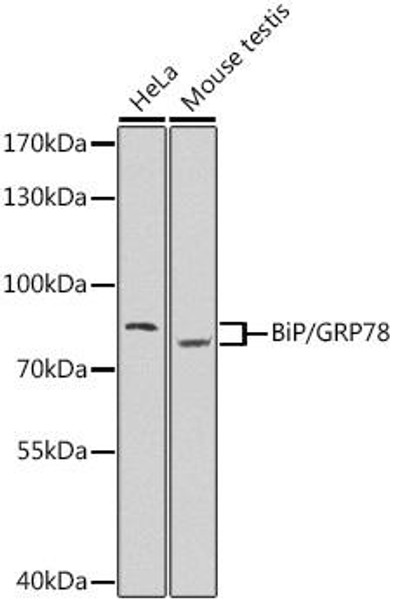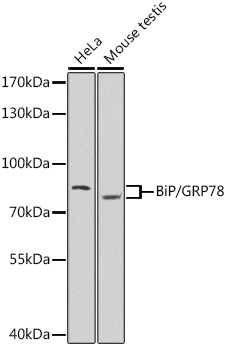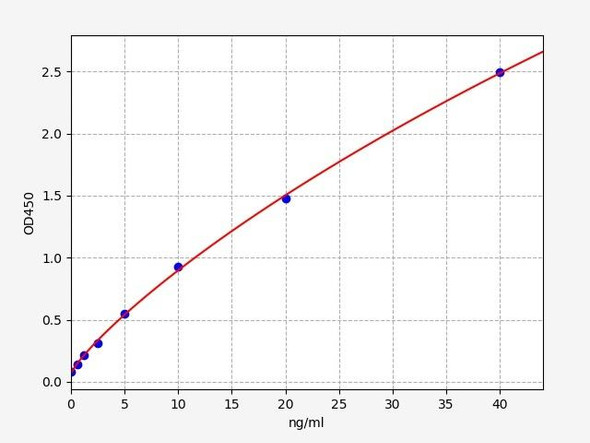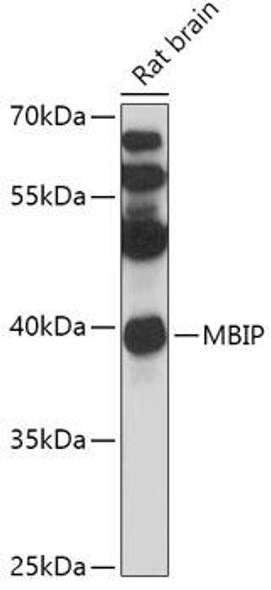Description
Anti-BiP/GRP78 Antibody (CAB11568)
The HSPA5 Polyclonal Antibody (CAB11568) is a valuable tool for researchers investigating HSPA5, also known as heat shock 70 kDa protein 5. This cell surface molecule is involved in protein folding and trafficking, making it essential for cellular homeostasis and stress response. The antibody, produced in rabbits, exhibits high reactivity with human samples and is validated for use in Western blot applications. By targeting the HSPA5 protein, this antibody enables researchers to detect and analyze HSPA5 expression in various cell types, making it ideal for studies in molecular biology and cell biology.
HSPA5 plays a crucial role in maintaining protein quality control and protecting cells from stress-induced damage. Dysregulation of HSPA5 has been linked to various diseases, including neurodegenerative disorders and cancer. By studying the function of HSPA5, researchers can gain insights into disease mechanisms and potentially identify therapeutic targets for interventions. The HSPA5 Polyclonal Antibody is a valuable tool for advancing our understanding of cellular stress response and its implications for human health.
| Antibody Name: | Anti-BiP/GRP78 Antibody |
| Antibody SKU: | CAB11568 |
| Antibody Size: | 20uL, 50uL, 100uL |
| Application: | WB |
| Reactivity: | Human, Mouse |
| Host Species: | Rabbit |
| Immunogen: | Recombinant protein of human BiP/GRP78 |
| Application: | WB |
| Recommended Dilution: | WB 1:500 - 1:2000 |
| Reactivity: | Human, Mouse |
| Positive Samples: | HeLa, Mouse testis |
| Immunogen: | Recombinant protein of human BiP/GRP78 |
| Purification Method: | Affinity purification |
| Storage Buffer: | Store at -20'C. Avoid freeze / thaw cycles. Buffer: PBS with 0.02% sodium azide, 50% glycerol, pH7.3. |
| Isotype: | IgG |
| Sequence: | Email for sequence |
| Gene ID: | 3309 |
| Uniprot: | P11021 |
| Cellular Location: | Cytoplasm, Endoplasmic reticulum lumen, Melanosome |
| Calculated MW: | 72kDa |
| Observed MW: | 72kDa |
| Synonyms: | HSPA5, BIP, GRP78, HEL-S-89n, MIF2 |
| Background: | The protein encoded by this gene is a member of the heat shock protein 70 (HSP70) family. It is localized in the lumen of the endoplasmic reticulum (ER), and is involved in the folding and assembly of proteins in the ER. As this protein interacts with many ER proteins, it may play a key role in monitoring protein transport through the cell. |
| UniProt Protein Function: | GRP78: a member of the HSP family of molecular chaperones required for endoplasmic reticulum integrity and stress-induced autophagy. Plays a central role in regulating the unfolded protein response (UPR), and is an obligatory component of autophagy in mammalian cells. May play an important role in cellular adaptation and oncogenic survival. One of the client proteins of GRP78 is protein double-stranded RNA-activated protein-like endoplasmic reticulum kinase (PERK). Probably plays a role in facilitating the assembly of multimeric protein complexes inside the ER. |
| UniProt Protein Details: | Protein type:Chaperone; Heat shock protein Chromosomal Location of Human Ortholog: 9q33.3 Cellular Component: signalosome; endoplasmic reticulum membrane; focal adhesion; smooth endoplasmic reticulum; cell surface; mitochondrion; endoplasmic reticulum; endoplasmic reticulum lumen; ER-Golgi intermediate compartment; membrane; melanosome; plasma membrane; integral to endoplasmic reticulum membrane; midbody; nucleus Molecular Function:protein domain specific binding; protein binding; enzyme binding; chaperone binding; ubiquitin protein ligase binding; unfolded protein binding; ATPase activity; ribosome binding; calcium ion binding; misfolded protein binding; glycoprotein binding; ATP binding Biological Process: platelet activation; ER-associated protein catabolic process; cerebellum structural organization; unfolded protein response; cerebellar Purkinje cell layer development; cellular response to glucose starvation; platelet degranulation; substantia nigra development; cellular protein metabolic process; unfolded protein response, activation of signaling protein activity; positive regulation of protein ubiquitination; blood coagulation; negative regulation of transforming growth factor beta receptor signaling pathway; ER overload response; positive regulation of cell migration; negative regulation of apoptosis |
| NCBI Summary: | The protein encoded by this gene is a member of the heat shock protein 70 (HSP70) family. It is localized in the lumen of the endoplasmic reticulum (ER), and is involved in the folding and assembly of proteins in the ER. As this protein interacts with many ER proteins, it may play a key role in monitoring protein transport through the cell.[provided by RefSeq, Sep 2010] |
| UniProt Code: | P11021 |
| NCBI GenInfo Identifier: | 14916999 |
| NCBI Gene ID: | 3309 |
| NCBI Accession: | P11021.2 |
| UniProt Secondary Accession: | P11021,Q2EF78, Q9NPF1, Q9UK02, B0QZ61, |
| UniProt Related Accession: | P11021 |
| Molecular Weight: | |
| NCBI Full Name: | 78 kDa glucose-regulated protein |
| NCBI Synonym Full Names: | heat shock 70kDa protein 5 (glucose-regulated protein, 78kDa) |
| NCBI Official Symbol: | HSPA5 |
| NCBI Official Synonym Symbols: | BIP; MIF2; GRP78; HEL-S-89n |
| NCBI Protein Information: | 78 kDa glucose-regulated protein; immunoglobulin heavy chain-binding protein; epididymis secretory sperm binding protein Li 89n; endoplasmic reticulum lumenal Ca(2+)-binding protein grp78 |
| UniProt Protein Name: | 78 kDa glucose-regulated protein |
| UniProt Synonym Protein Names: | Endoplasmic reticulum lumenal Ca(2+)-binding protein grp78; Heat shock 70 kDa protein 5; Immunoglobulin heavy chain-binding protein; BiP |
| UniProt Gene Name: | HSPA5 |
| UniProt Entry Name: | GRP78_HUMAN |










